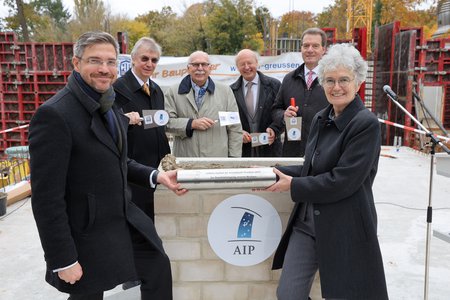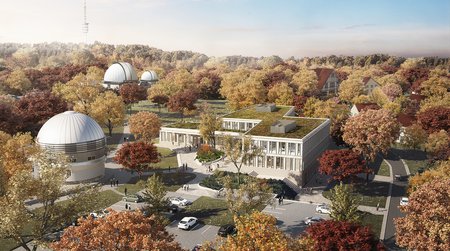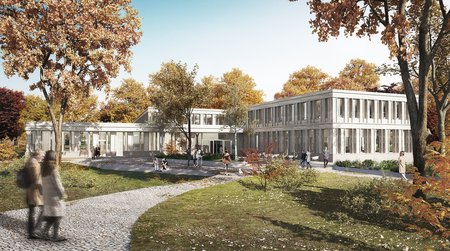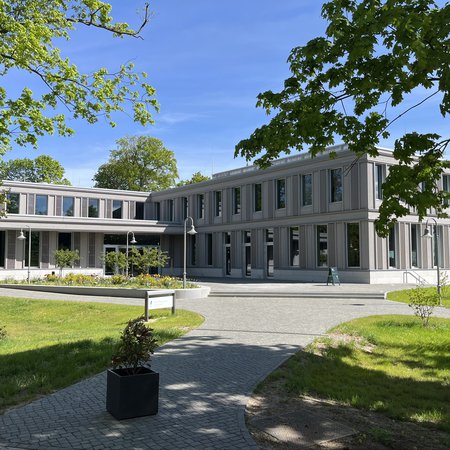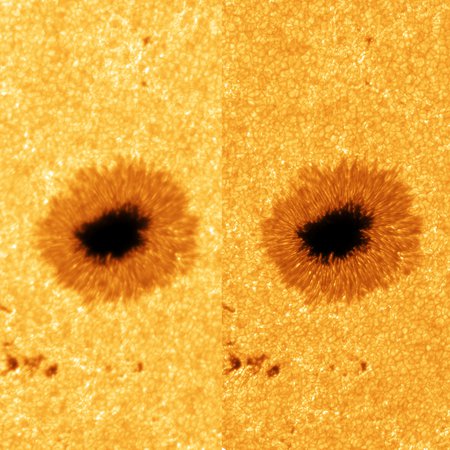AIP celebrates laying of first stone for new institute building
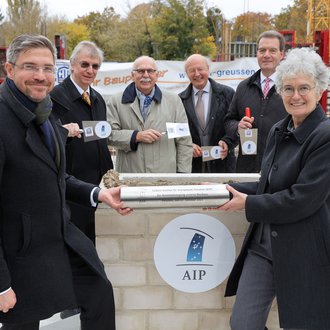
Mike Schubert, Matthias Steinmetz, Matthias Kleiner, Klaus Strassmeier, Wolfram Rosenbach and Inge Schlotzhauer with the time capsule at the foundation stone.
Credit: AIP, Thomas SpikermannThe Leibniz Institute for Astrophysics Potsdam (AIP) today celebrated the laying of the foundation stone for its extension building at the Babelsberg campus together with Dr Inge Schlotzhauer, Head of Division for Non-University Research, Brandenburg Ministry of Science, Research and Culture and Chair of the Board of Trustees of AIP, the Mayor of the State Capital Potsdam, Mike Schubert, and the President of the Leibniz Association, Prof Matthias Kleiner. Some 200 guests were welcomed by the institute’s spokesperson of the Executive Board and scientific chairman Prof Matthias Steinmetz.
Matthias Steinmetz welcomed the assembled guests, “We are pleased today to be laying the foundations, both literally and metaphorically, to provide the institute with the best possible spatial setup for the coming challenges of astrophysical research with this new building.” The institute is expanding its site at Babelsberg in Potsdam with a multi-purpose building. Wolfram Rosenbach, Administrative Chairman of the AIP board, emphasises: “It will be an energy-efficient building with geothermal energy and photovoltaics, and its construction and appearance with a wooden façade will blend harmoniously with the mixture of historical and modern buildings on the institute's grounds.”
With a usable area of 2,620m², the plan is to create an exhibition area for interesting objects such as historical instruments and a conference hall for up to 199 guests, in addition to meeting rooms and offices for the academic staff - something which the growing institute urgently needs. Space is also being planned for an advanced cafeteria service.
The Minister for Science, Research and Culture of the State of Brandenburg, Dr Manja Schüle, has praised the development at AIP: “At the Leibniz Institute for Astrophysics Potsdam, people are passionate about to looking to the stars. This is where the really big questions are asked: How do galaxies form? What is dark matter? Is there life in the universe? This is an institute rich in tradition and its significance continues to grow, year after year. Just last April, the AIP once again impressively demonstrated its excellence when two of its academic staff received ERC Advanced Grants, the world's most important award for established researchers. Today, a foundation has been laid for the future with the laying of the foundations for a new building at the institute. The number of staff at AIP has almost doubled in recent years, so more space is urgently needed - for working and for meetings. After all, science thrives on dialog and networking, on ideas and stimulation. In addition, the new building will give the AIP greater visibility as an organiser of scientific events in a heavily international field of research. And that is something else which I think is truly: that there, in this building, real life and cutting-edge research will be brought together. That's how - in a very earthly way - the Made in Brandenburg future works.”
The AIP's listed site of what is now the AIP was originally part of Babelsberg Park, so historic preservation was central to the bidding process for the new building. The location has been chosen in a way that ensures that the new building fits perfectly into the park-like landscape and preserves as many trees as possible. Its tiered construction will be well suited to the existing terrain.
Mayor Mike Schubert explains: “The laying today of the foundation stone for the new building at the Leibniz Institute for Astrophysics Potsdam is a marker of the outstanding scientific achievements of the institute and also of the further positive development of Potsdam as an academic centre of excellence. The requirements for future-ready and sustainable working conditions in cutting-edge research and the demands placed on a building on this listed research campus, located as it is in the immediate vicinity of a UNESCO World Heritage Site, have been brought together into an impressive solution. I wish the AIP every success for the construction phase that is about to begin.”
Staff at AIP were able to contribute their ideas on spatial and functional needs in a survey, and a user committee is overseeing planning and now the construction phase. Construction began on 8. February 2021 with the first site preparations. Construction of the shell began in August, and since then a large part of the foundation slab has already been poured. The building is scheduled for completion by mid-2024. The Berlin office Thomas Müller Ivan Reimann Gesellschaft von Architekten mbH are realising the new building project.
Matthias Kleiner, President of the Leibniz Association, adds, “The great reputation of the Leibniz Institute for Astrophysics makes it a magnet for researchers from all over the world. This increase in personnel, as well as the considerable volume of external funding that has been acquired, has meant that the institute needs more space for its outstanding research. This was an issue already raised by the last, extraordinarily successful evaluation of the AIP by the Senate of the Leibniz Association. I am pleased that this need can now be met in line with the framework conditions imposed by the UNESCO World Heritage status of Babelsberg Park.”
Further information
Images
Mike Schubert, Matthias Steinmetz, Matthias Kleiner, Klaus Strassmeier, Wolfram Rosenbach and Inge Schlotzhauer with the time capsule at the foundation stone.
Big screen size [1000 x 666, 130 KB]
Original size [5472 x 3648, 2.1 MB]
Aerial view of the new building.
Big screen size [1000 x 559, 190 KB]
Original size [2268 x 1270, 1000 KB]
The planned new building, viewed from the library building.
Big screen size [1000 x 559, 210 KB]
Original size [2268 x 1270, 1.0 MB]
